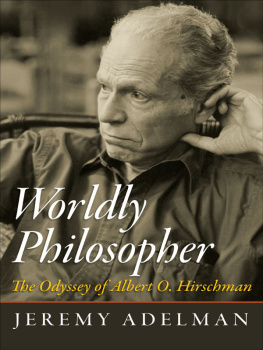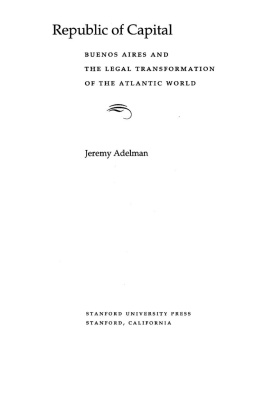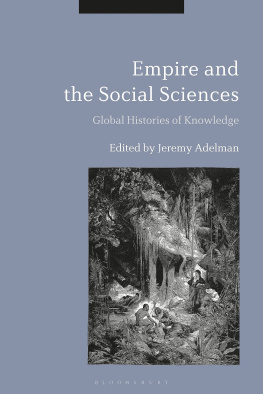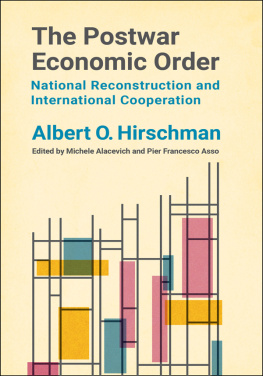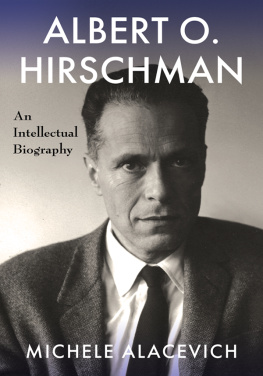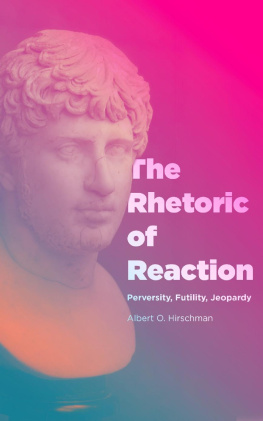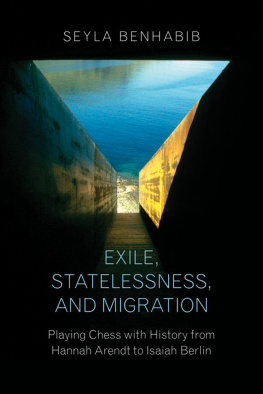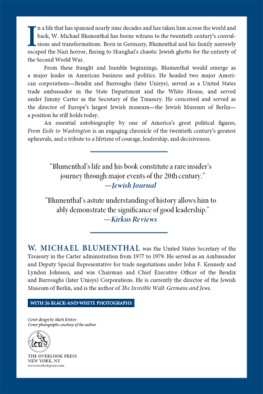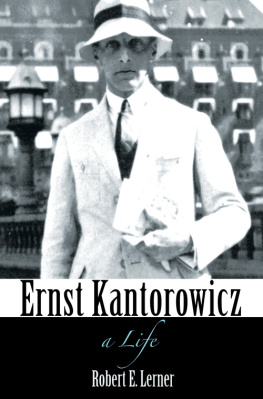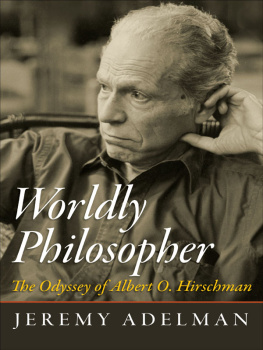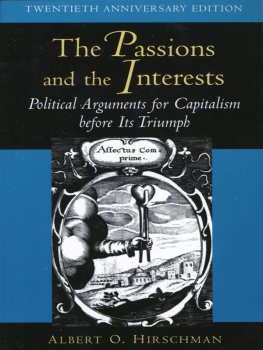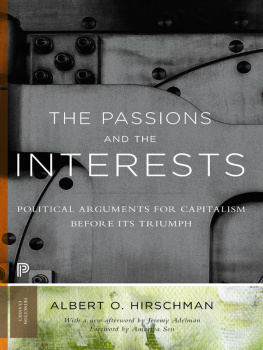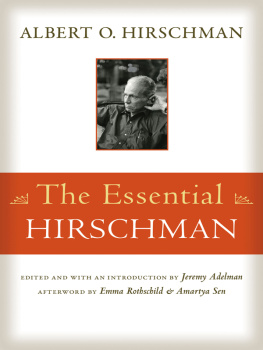
Worldly Philosopher
JEREMY ADELMAN
Worldly Philosopher
The Odyssey of Albert O. Hirschman
PRINCETON UNIVERSITY PRESS
Princeton and Oxford
Copyright 2013 by Princeton University Press
Requests for permission to reproduce material from this work should be sent to Permissions, Princeton University Press
Published by Princeton University Press, 41 William Street, Princeton, New Jersey 08540
In the United Kingdom: Princeton University Press, 6 Oxford Street, Woodstock, Oxfordshire OX20 1TW
press.princeton.edu
All Rights Reserved
Library of Congress Cataloging-in-Publication Data
Adelman, Jeremy.
Worldly philosopher : the odyssey of Albert O. Hirschman / Jeremy Adelman.
pages cm
Summary: Worldly Philosopher chronicles the times and writings of Albert O. Hirschman, one of the twentieth centurys most original and provocative thinkers. In this gripping biography, Jeremy Adelman tells the story of a man shaped by modern horrors and hopes, a worldly intellectual who fought for and wrote in defense of the values of tolerance and change. Born in Berlin in 1915, Hirschman grew up amid the promise and turmoil of the Weimar era, but fled Germany when the Nazis seized power in 1933. Amid hardship and personal tragedy, he volunteered to fight against the fascists in Spain and helped many of Europes leading artists and intellectuals escape to America after France fell to Hitler. His intellectual career led him to Paris, London, and Trieste, and to academic appointments at Columbia, Harvard, and the Institute for Advanced Study in Princeton. He was an influential adviser to governments in the United States, Latin America, and Europe, as well as major foundations and the World Bank. Along the way, he wrote some of the most innovative and important books in economics, the social sciences, and the history of ideas. Throughout, he remained committed to his belief that reform is possible, even in the darkest of times. This is the first major account of Hirschmans remarkable life, and a tale of the twentieth century as seen through the story of an astute and passionate observer. Adelmans riveting narrative traces how Hirschmans personal experiences shaped his unique intellectual perspective, and how his enduring legacy is one of hope, open-mindedness, and practical idealismProvided by publisher.
Includes bibliographical references and index.
ISBN 978-0-691-15567-8 (hardback)
1. Hirschman, Albert O. 2. EconomistsBiography. 3. Economics. 4. Economic development. I. Title.
HB75.A3358 2013
330.092dc23
[B]
2012046072
British Library Cataloging-in-Publication Data is available
This book has been composed in Garamond Premier Pro
Printed on acid-free paper.
Printed in the United States of America
10 9 8 7 6 5 4 3 2 1
For my childrenSammy, Jojo, and Sadie
Even when our trust is heavily placed in them, reasoning and education cannot easily prove powerful enough to bring us actually to do anything, unless in addition we train to form our Soul by experience for the course on which we would set her; if we do not, when the time comes for action she will undoubtedly find herself impeded.
MICHEL DE MONTAIGNE
CONTENTS
ACKNOWLEDGMENTS
A lbert O. Hirschman has accompanied me my whole adult life. As a teenager growing up in Toronto, I spied a small green-covered volume on my fathers bookshelf behind his big oak desk. I would look at it while talking with him, intrigued by the title, The Passions and the Interests. Following a long tradition of teenage sons, I borrowed it. Permanently. That book now rests on my shelf behind my desk. My children, too, will grow up with Hirschman, though they, unlike me, have no choice in the matter. It is to them that this volume is dedicated because people without choice, especially young ones, deserve to be acknowledged for everything they tolerate when no one asks if they mind.
Writing a life history, I have learned, has meant living with a person for days, months, and years. But there is more: in the moments of maximum intensity, it requires seeing the world through the eyes of ones subject, becoming increasingly aware of what one does not and may never know, for the tacit barriers erected during a lifetime are part of the world-experience itself. To help me piece through this maze over the course of a decade of research and writing, I heard many different Hirschman stories, which of course raises the inevitable question: how does what he seemed to others figure into the tale? The life history has to accommodate the views of those people as well. Some are cited in my notes; some have gone uncited but were illuminating nonetheless in helping me reconstruct the man and his moments. In alphabetical order, the list includes Michele Alacevich, Martin and Daniel Andler, Sheldon Annis, Kenneth Arrow, Paul Audi, Jorge Balan, Carlos Bazdresch, Scott Berg, Samuel Bowles, Peter Bell, Richard Bird, Glen Bowersock, Colin Bradford, David Cannadine, Fernando Henrique Cardoso, Miguel Centeno, Douglas Chalmers, Annie Cot, Robert Darnton, Angus Deaton, Mitchell Denburg, Sir John Elliott, Maria Feijoo, Osvaldo Feinstein, Alejandro Foxley, Alan Furst, Carol Gilligan, Herbert Gintis, Louis Goodman, Peter Gourevitch, Francisco Gutirrez, Peter Hakim, Stanley Hoffmann, Thomas Horst, Sheila Isenberg, Peter Kenen, Stephen Krasner, Susan James, Elizabeth Jelin, the late Michael Jimnez, Salomn Kalmanovitz, Robert Kaufman, James Kurth, Wolf Lepenies, Kirsten von Lingen, Abraham Lowenthal, Emmanuelle Loyer, Eric Maskin, Anthony Marx, Michael McPherson, Patricio Meller, Mary Morgan, Philip Nord, Sabine Offe, Claus Offe, Gilles Pecout, Jeffrey Puryear, Henry Rosovsky, Emma Rothschild, Michael Rothschild, Jeffrey Rubin, Charles Sabel, Alain Salomon, Thomas Schelling, Philippe Schmitter, Roberto Schwarz, Joan Scott, Rebecca Scott, Amartya Sen, Jos Serra, Rajiv Sethi, William Sewell, Quentin Skinner, Mark Snyder, Christine Stansell, Paul Streeten, Frank Sutton, Judith Tendler, Miguel Urrutia, Maurizio Viroli, Ignacio Walker, Donald Winch, and Philip Zimbardo. I was fortunate to have been able to interview some before their passing, notably Carl Kaysen and Alexander Stevenson. Others, such as Guillermo ODonnell and Clifford Geertz, were gone before I could arrange formal interviews. I am grateful to Andrea and Carlo Ginzburg for a very long lunch in Bolognawhich did so much to help me understand the multiple Italian influences on Hirschman. Thank you to Eva Monteforte, Alberts younger sister, with whom I spent a wonderful week in Rome going over her memories, letters, and photographs. Katia Salomon, Alberts daughter, was always willing to set aside precious time from visiting aging parents to speak with me and share her fathers letters. I appreciate her trust and friendship.
Most of all, it was Alberts late wife, Sarah, who guided me through memories of a life she shared with a remarkable, complicated man, opening their personal letters and diaries for my curious eyes. In many ways, I have come to see Hirschman through his wifes eyesitself a challenge to consider. Yet, a biographer could only dream of such companionship; I only hope that it in some way helped her recover forgotten aspects of a life as Albert grew ill and spectral and was increasingly unable to follow the course of our conversations. We made a deal at one point that I would finish this book before she died; it was, I fear, a bit of a one-sided pact, for Sarah read not just one rough draft, but also a second one as cancer was killing her. She died in January 2012, before I could commit final touches to a work she had such a hand and voice in crafting. That she did not live to see this published is more than sadbut it is not a tragedy. While it was not easy to juggle the roles we played for each other, she was to me an invaluable source, a thoughtful reader, and a dear, dear friend.
Next page
